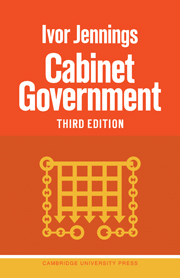Book contents
- Frontmatter
- Contents
- PREFACE
- CHAPTER I THE BRITISH CONSTITUTION
- CHAPTER II THE CHOICE OF A PRIME MINISTER
- CHAPTER III THE FORMATION OF A GOVERNMENT
- CHAPTER IV THE ADMINISTRATION
- CHAPTER V MINISTERS AT WORK
- CHAPTER VI INTER-DEPARTMENTAL RELATIONS
- CHAPTER VII TREASURY CONTROL
- CHAPTER VIII THE PRIME MINISTER
- CHAPTER IX THE CABINET
- CHAPTER X WAR AND DEFENCE
- CHAPTER XI ECONOMIC POLICY
- CHAPTER XII CONSTITUTIONAL MONARCHY
- CHAPTER XIII THE PERSONAL PREROGATIVES: DISMISSAL OF MINISTERS, DISSOLUTION OF PARLIAMENT, CREATION OF PEERS
- CHAPTER XIV PATRONAGE AND HONOURS
- CHAPTER XV GOVERNMENT AND PARLIAMENT
- APPENDIX I. GOVERNMENTS SINCE 1835
- APPENDIX II. EXAMPLES OF GOVERNMENTS
- APPENDIX III. THE PREROGATIVE OF DISSOLUTION
- APPENDIX IV. BIOGRAPHICAL AND BIBLIOGRAPHICAL NOTES
- INDEX
CHAPTER XIV - PATRONAGE AND HONOURS
Published online by Cambridge University Press: 23 September 2009
- Frontmatter
- Contents
- PREFACE
- CHAPTER I THE BRITISH CONSTITUTION
- CHAPTER II THE CHOICE OF A PRIME MINISTER
- CHAPTER III THE FORMATION OF A GOVERNMENT
- CHAPTER IV THE ADMINISTRATION
- CHAPTER V MINISTERS AT WORK
- CHAPTER VI INTER-DEPARTMENTAL RELATIONS
- CHAPTER VII TREASURY CONTROL
- CHAPTER VIII THE PRIME MINISTER
- CHAPTER IX THE CABINET
- CHAPTER X WAR AND DEFENCE
- CHAPTER XI ECONOMIC POLICY
- CHAPTER XII CONSTITUTIONAL MONARCHY
- CHAPTER XIII THE PERSONAL PREROGATIVES: DISMISSAL OF MINISTERS, DISSOLUTION OF PARLIAMENT, CREATION OF PEERS
- CHAPTER XIV PATRONAGE AND HONOURS
- CHAPTER XV GOVERNMENT AND PARLIAMENT
- APPENDIX I. GOVERNMENTS SINCE 1835
- APPENDIX II. EXAMPLES OF GOVERNMENTS
- APPENDIX III. THE PREROGATIVE OF DISSOLUTION
- APPENDIX IV. BIOGRAPHICAL AND BIBLIOGRAPHICAL NOTES
- INDEX
Summary
Appointments
Lord Melbourne's famous remark, ‘Damn it, another bishop dead’, is succinct evidence of the difficulties attached to the comparatively unimportant function of administering the patronage vested in the Crown and exercised by ministers. Its importance was great so long as the House of Commons was ‘managed’ by the Crown or Government with the assistance of Treasury or Admiralty patronage. But Burke's Economy Act and other legislation and, above all, the passing of the Reform Act, immensely diminished its political value. Sir Robert Peel and Sir James Graham, too, established the system of paying more attention to merit than to political advantage. ‘The party interests of a Government’, said Peel, ‘are in the long run much better promoted by the honest exercise of patronage than by the perversion of it for the purpose of satisfying individual supporters.’ Similarly, speaking of honours, he said: ‘I am resolved to consider the power of conferring them as a great public trust, to be administered on some public principle, such as, for instance, the strengthening of the Administration by rewarding those who do not hold office, or, in the case of those who do hold office, bestowing honours as the reward for public service, distinguished either by the length and fidelity of it, or by the eminence of it.’
The acceptance of these principles did not imply a complete dissociation between party advantage and the exercise of powers of appointment and conferring honours. Mr Gladstone, as Member of Parliament for Oxford University, was particularly insistent in pressing the claims of his constituents on Lord Palmerston.
- Type
- Chapter
- Information
- Cabinet Government , pp. 451 - 471Publisher: Cambridge University PressPrint publication year: 1959



